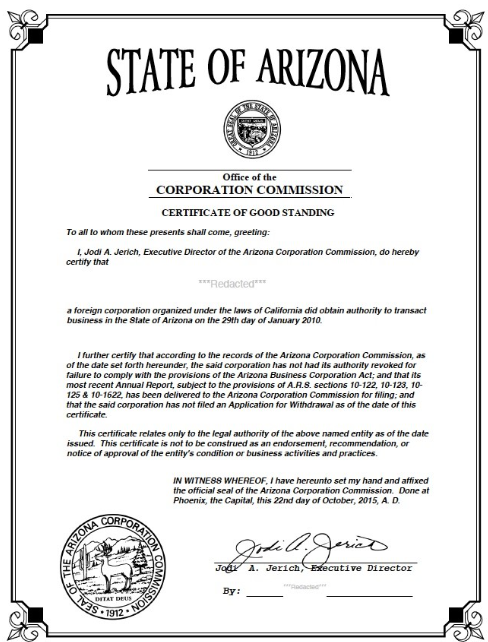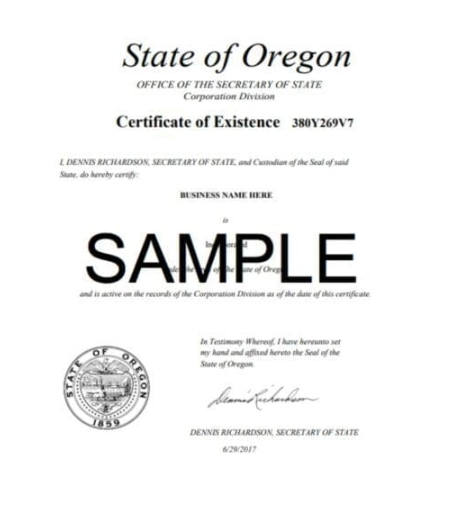If you own a business, you may have heard of certificates of good standing, but there’s a lot of variation out there, particularly when you look at specific states. What are they? Do you need one? If you do, how do you apply for one? Let’s dive in.
What is a certificate of good standing?
Depending on where you are, a certificate of good standing is also sometimes called a good standing certificate, certificate of existence, status, authorization, or compliance. This documentation essentially confirms that your business is legally registered with the state and is authorized to do business there. Additionally, it shows that your business has paid its taxes, filed all required documents, and complied with all regulations that apply in the state.
This is where the certificate of good standing gets its name, as it acts as proof that the business has been following all requirements and is in “good standing” with the state it does business. The types of business entities that can obtain a certificate of good standing are:
- Corporations (including S-corps and C-corps)
- Limited Liability Companies (LLCs)
- Limited Partnerships
- Limited Liability Partnerships (LLPs)
The types of businesses that cannot get a certificate of good standing are:
- Sole Proprietorships
- General Partnerships
Do you need a good standing certificate?
While not necessary for daily business, there will be a time (or several times) when you will need to procure a certificate of good standing for your business. This is because it can be required for opening a business bank account, raising funds from investors, recruiting business partners, selling a business, bidding on government contracts, and more. Throughout a company’s life, you will inevitably run into these events or requirements, and you will often need a certificate of good standing to complete them.
How long is a certificate of good standing valid?
Certificates of good standing typically have expiration dates, but the length will vary depending on what state you operate in and what the certificate is for. In most cases, the standard is 90 days (or three months), but this can be longer or shorter if a lender or interested party deems it necessary.
How to get a certificate of good standing
If you’ve met the requirements we mentioned earlier of being up to date on all of your taxes, fees, reports, and documentation, you can begin the process of getting your certificate of good standing. However, there are differences in options (and cost) from state to state, so here’s what to know, no matter where in the country you are:
Alabama
- Certificate of existence online form
- $28 online filing fee
- $10 mail or in-person filing fee
Alaska
- Certificate of compliance online form
- $10 filing fee
Arizona
- Online form (then click “How do I get a Certificate of Good Standing?”)
- $10 regular filing fee
- $45 expedited filing fee
Arkansas
- Online form
- $25 filing fee
California
- Online form
- $15 in-person filing fee
- $5 mail filing fee
Colorado
- Online form
- No filing fee
Connecticut
- Certificate of legal existence online form
- $50 regular filing fee
- $100 expedited filing fee
Delaware
- Certificate of status online form
- $50 filing fee
District of Columbia (Washington, D.C.)
- Online form
- $50 filing fee
Florida
- Certificate of status online form
- $5 filing fee for LLCs
- $8.75 filing fee for corporations
Georgia
- Certificate of existence online form
- $10 normal filing fee
- $60 expedited filing fee
Hawaii
- Online form
- $7.50 filing fee
Idaho
- Online form
- $11.50 online filing fee
- $10 mail, fax, phone, or in-person filing fee
Illinois
- Online form
- $25 regular filing fee
- $45 expedited filing fee
Indiana
- Certificate of existence online form
- $25 online filing fee
- $15 mail, fax, or in-person filing fee
Iowa
- Certificate of existence online form
- $5 filing fee
Kansas
- Online form
- $10 online filing fee
- $15 mail or phone filing fee
Kentucky
- Online form
- $10 online, mail, or in-person filing fee
- $15 fax filing fee
Louisiana
- Online form
- $20 filing fee
Maine
- Certificate of existence online form
- $30 filing fee
Maryland
- Certificate of status online form
- $40 online or in-person filing fee
- $20 mail filing fee
Massachusetts
- Online form
- $15 online filing fee
- $12 mail or in-person filing fee
Michigan
- Online form
- $10 online filing fee
- $12.50 in-person filing fee
Minnesota
- Certificate of status online form
- $15 online filing fee
- $5 mail or in-person filing fee
Mississippi
- Online form
- $25 filing fee
Missouri
- Online form
- $10 filing fee
Montana
- Certificate of existence online form
- $5 filing fee
Nebraska
- Online form
- $6.50 online filing fee
- $10 mail or in-person filing fee
Nevada
- Online form
- $50 filing fee
New Hampshire
- Online form
- $5 online filing fee
- $25 for expedited service
New Jersey
- Online form
- $50 filing fee for LLCs
- $25 filing fee for corporations
New Mexico
- Online form
- $25 filing fee for LLCs
- $50 filing fee for corporations
New York
- Certificate of status online form
- $25 regular filing fee
- $50 expedited filing fee
North Carolina
- Online form
- $10 online filing fee
- $15 mail, fax, phone, or in-person filing fee
North Dakota
- Online form
- $20 filing fee
Ohio
- Online form
- $5 filing fee
Oklahoma
- Online form
- $20 filing fee
Oregon
- Certificate of existence online form
- $10 filing fee
Pennsylvania
- Online form
- $40 filing fee
Rhode Island
- Online form
- $22 online filing fee
- $20 mail, phone, or in-person filing fee
South Carolina
- Online form
- $10 filing fee
South Dakota
- Online form
- $20 online filing fee
- $35 mail, fax, or in-person filing fee
Tennessee
- Certificate of existence online form
- $20 filing fee
Texas
- Certificate of status online form
- $15 filing fee
Utah
- Certificate of existence online form
- $12 filing fee
Vermont
- Online form
- $25 filing fee
Virginia
- Online form
- $6 filing fee
Washington
- Certificate of existence online form
- $20 regular filing fee
- $50 expedited filing fee
West Virginia
- Certificate of existence online form
- $10 filing fee
Wisconsin
- Certificate of status online form
- $10 filing fee
Wyoming
- Online form
- No online filing fee
- $10 mail or in-person filing fee
Good standing certification FAQs
What does a certificate of good standing look like?
A certificate of good standing is a simple document that will typically have the business’s name, registration number, the state’s seal, date of issue, and a statement confirming the business is authorized to operate and compliant with state regulations. Appearance will vary by state, but below you can view a sample of a good standing certificate from Arizona, followed by a certificate of existence sample from Oregon.


Where do I get a certificate of good standing?
Though the process will vary state-by-state, you will usually go to your state’s Secretary of State office. In many cases, you can submit the forms online or mail instead of going in person. To be sure you have a smooth application, you’ll want to check with your specific state to see their requirements.
What is a certificate of good standing for an LLC?
When it comes to LLCs, a certificate of good standing is often required for business transactions, securing loans, or expanding operations. This document verifies the LLC is legally registered and follows state requirements.
Don’t go through it blind
If you need help with your certificate of good standing or anything else related to federal registration and contracting for small businesses, FAMR has the experience to help you through your journey. From additional certifications to marketing your company for more federal contracts, we ensure that you get the funding and opportunities that you deserve, all with an ally in your corner.
Whether you’re a seasoned government contractor or a new small business owner, our team of experts is ready to guide you through the intricacies of federal contracting. Your journey to federal contracting excellence starts with us.
Call us today to explore how you can maximize your awards, make a lasting impact, and thrive in the competitive realm of federal contracting!


